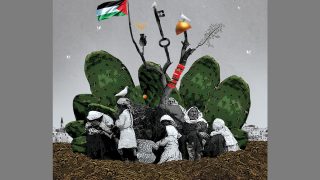Over the last decades, the calls for the two state solution in Palestine have been raised at the level of mantras. So, when recently, the United States president casually announced in the presence of B.Netanyahu that he was not attached whatsoever to the two-state solution for the so-called Palestinian-Israeli conflict, it caused the UN, the Palestinian Authority as well as the Arab League to reiter their attachment to the two-state solution. The UN has recommended partition in 1947 and has since then kept the same discourse and course of action and the PA was born out of the negotiations supposed to lead to a two-state status quo. Even the Hamas, has now decided to change its charter to make its adherence to the two state solution more official.
On the ground, however, over the decades, Israel has been dangling the two state solution while methodically in a systematic fashion tearing apart any possibility to create a sovereign and independent Arab Palestinian state. Israel has been assuming direct and indirect control over all the territories from the mediterranean sea to the Jordan river - through ethnic cleansing, colonisation, expropriation, population control, lethal attacks etc. Israel being nothing if not relentless and practical, the Israeli government recently rendered its colonisation legal through its democratic justice system.
The present situation in Palestine-Israel is not the result of a “failure” of the negotiations, it is the result of a process that itself stems from the events that took place in the Middle East and particularly in Palestine before, during and after WWI. Events that proceed from a combination of imperial colonialism and settler colonialism. This combination as we will see below, led to the proposal of partition by the colonial power and its successor the International Community and this same combination renders partition impossible.
Colonialism & partition
Palestine's partition was evoked for the first time in an official public report by the Palestine Royal Commission in 1937 – although it had been in a way in the pipes for a long time. The commission’s recommendations were based on the “incompatibility” of the Arab and Jewish national aspirations stating that : “Partition seems to offer at least a chance of ultimate peace. We can see none in any other plan.”. Partition was proposed as a solving device, which Britain had already used in the Irish case a few years before.
The arguments of incompatibility between aspirations and that of the lesser evil have since constituted the main arguments in most partitions just as they constitute the cornerstone in partition theory.
Partition which came to “assume a political meaning” and entered the political lexicon only towards the end of the eighteenth century with the partition of Poland (Thomas G. Fraser, 1984, KJ Rankin 2006) may be defined “[...] as an externally proposed and imposed fresh border cutting through a least one community’s national homeland, creating at least two separate units under different sovereigns and authorities (Brendan O'Leary, 2006)”. The notions of external proposition and imposition, fresh cut, separation and past national homeland are here central (See Joe Cleary 2002, Louis Kriesberg 2000).
Externally proposed because as highlighted by Radha Kumar, “historically, ethnic partitions have occurred either under a colonial policy of divide and rule or in the context of colonial transfer of power” (Radha Kumar 2000). Joe Cleary, for his part, further explains that “As a general rule, then, it would seem that partitions are most likely to occur where – as a consequence of colonial rule or of total military collapse in times of war – societies have lost control over their own political destinies and are vulnerable to the wills of external superpowers” (Joe Cleary 2002).
Scholars observe however, that partition has not occurred in all competing ethno-nationalist conflicts but specifically in areas that have been subjected to colonisation or to some other form of external power - the international bodies representing one such power - which often exacerbated ethno-nationalist conflicts. There exists an ongoing debate about the relevance of partition as a solution to ethno-nationalist conflictual competitions given that partitions have always provoked oppositions within the concerned societies and spaces (Thomas G.Fraser, 1984).
However, it has raised growing interest among scholars even more after the 1995 Dayton Peace Agreement for former Yugoslavia. One of the main contributions in the field is Thomas G. Fraser's 1984 study on the partitions of Ireland, India and Palestine as part of the sphere of control and/or influence of the United Kingdom. Each one of the three cases had the particularity of being part of the “British system” and in each case, partition has emerged as a 'problem-solving' device adopted in an attempt to meet the claims of conflicting political aspirations”. However, in Palestine, whilst there were two conflicting national movements under British political rule (Nadim Rouhana, XXXX), one of them also happened to be a settler colonial movement, Zionism. Furthermore, this movement obtained a seal of approval from the colonial power in charge and from the instances that followed the said colonial power.
Settler colonialism, from exclusion to elimination
The question of whether Zionism is a settler colonial movement continues in some milieux to be controversial. This is mainly due to general assumptions on colonialism, colonisation and its product, the colony. Indeed, it is generally assumed that a colony is necessarily a territory linked to and depending on a metropole or a capital (Maxime Rodinson, 1981). This argument has been used by the Zionist movement to dismiss comments about its colonial character, whilst acknowledging the fact that colonisation was part of the Zionist project (Joseph Massad, 2006):
“The Zionist movement was and presented its project of creating a Jewish State through colonization as part of the European colonizing world, while “socialist” variants of it were presenting the Zionist project as one assisting in combating imperialism and the world capitalist order. Later, the Zionist establishment itself, which had initially presented its project as colonial, was presenting itself as a movement of national liberation constituting its project as anti-colonial in nature, albeit one established through colonization but not colonialism!”
Palestinians and Arabs were aware of the settler colonial nature of Zionism well before settler colonial studies came to develop and before the term was coined. They knew that the Zionist movement aimed at excluding them and eventually replacing them in Palestine. They were aware that this was not to be put on the same level as British colonialism.
And indeed, settler-colonialism has to be tackled as a global and distinct phenomenon, distinct from metropole colonialism (Lorenzo Veracini 2010, Patrick Wolfe 1999 etc.) and scholars of settler colonialism agree on the settler-colonial character of Zionism.
In the lineage of Maxime Rodinson, these scholars have come to identify Zionism as a settler colonial movement and to acknowledge the exclusionist and eliminatory potential of settler colonialisms and a fortiori of Zionism. Furthermore, for Patrick Wolfe (2006), settler colonies are rather “premised on displacing indigenes from (or replacing them on) the land” in a “destroy and replace” fashion. As indeed, the focus of settler-colonial ideology is land over labour contrary to classical imperial colonialism. This is best illustrated by the Jewish labour policy, namely the organisation of Jewish labour in all Jewish areas and enterprises while forbidding with the use of violence if necessary the employment of Arabs. As a matter of fact, the development of Zionism in Palestine simultaneously depended on and promoted the “massive exclusion of less-expensive indigenous Arab labour from employment in all segments of the Jewish sector of the local economy” (Gershon Shafir in Uri Ram, 1999). Indeed, this economic separatism was a cornerstone in the construction of an autonomous and homogeneous settler society and eventually in the official acceptance of partition. Shafir argues that Israeli colonisation could only be exercised in two ways: "maximalist territorial exclusivism, the logical conclusion of which is the removal of the Palestinian Arabs; and the territorial partition of Eretz Israel/Palestine, leading to separate Israeli and Palestinian national development”. The Zionist movement chose realism and started with the latter while keeping the former in mind and in action as shown by Ben Gurion’s letter to his son after the release of the 1937 Partition Plan.
Acceptance of partition and legitimation of colonialism and settler-colonialism
As a settler colonial movement, Zionism and its product Israel is not set on stopping its conquest and replacement policy until it has fulfilled the full potential of Zionism which is the conquest of all of Palestine as some would say – the maximum of land with the minimum of Arabs.
Using words as deadlock or failure to characterise the peace process falls short of reality, it is mistaking the nature of the forces that led to the present situation and that continue to be in motion. Settler colonialism does not seek the approval of the indigenous people, it is never content with what the indigenes are ready to sacrifice.
By accepting the principle of partition in the late 1970’s and officialising its acceptance in 1988, the PLO chose to have a voice for the Palestinians on the negotiation table, save what could be saved and join the circle of nation-states. At the same time however, it has given a seal of approval to colonial thought and ethnic partition just as it legitimised a settler colonial movement and its representative.
However, today, by continuing to advocate the two-state solution, the PA, the UN and all the supporters of the two state solution are ignoring the settler colonial nature of Zionism and Israel and thus legitimising colonisation, honouring colonialism’s legacy and above all contributing to the Israeli rhetoric.
Colonisation has introduced settler colonialism and partition, decolonisation calls for thinking and developing anti-partitionist perspectives to defeat settler colonialism.




